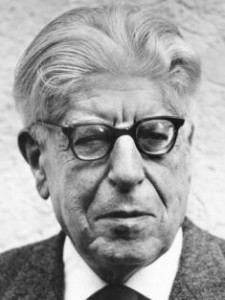Ernst Bloch (1885-1977)

With hair this good, how can he not be a true philosopher?
About Ernst Bloch:
* German-born Jewish cultural critic
* Focused heavily on the utopian charge of great art, which points the reader, viewer, or listener to a future that is always on the periphery of our understanding and in the process of becoming: “Every great work of art thus still remains, except for its manifest character, impelled towards the latency of the other side, i.e. towards the contents of a future which had not yet appeared in its own time, if not towards the contents of an as yet unknown final state. For this reason alone great works have something to say to all ages.” (Principle of Hope Vol. 1, page 127)
Main works:
o Spirit of Utopia
o Heritage of Our Times
o Principle of Hope Volumes 1-3
o Atheism in Christianity
Biggest influences:
o Utopian thought
o Liberation theology
o Cultural studies
Bloch’s Engagement with Heraclitus
The Spirit of Utopia – an early view of Bloch’s utopian consciousness and culture studies, written during the first world war.
Bloch traces the movement of thought from West to East, stating that the dependence on the physical in traditional Western thought always gives way to a turn to the East, giving Alexander as an example:
…rather, Alexander, the chosen commander of the Hellenic alliance, left Greece in order to descend to his “preliminary stage,” tired of all the artificial occidentalism, no differently than Heraclitus, Pythagoras abandoned the all too human statues, the euphrosyne without depth, and the world’s perfect sphaira, in order to unharness longing, neo-Platonic transcendence, the construction of domes within this world. (169)
Here Bloch speaks of Heraclitus only in passing, but paints him in the light of a philosopher who left an empty physicality to look for something higher. While this is his only mention in Spirit, it fits within Bloch’s mission to look at the features of culture that point away from what exists towards a possibility that lies elsewhere, and it provides the context for his greater engagement with Heraclitus in the future.
Note on rhetoric: Sadly, one common feature of Bloch’s writing is a winding, indirect approach to topics riddled with neologisms within page-long sentences. This reflects, to some degree, his appreciation for realizing new ideas, but causes many problems for translators and his readers, as evidenced in the quote above.
Principle of Hope – Bloch’s three volume seminal work
Volume 1, Part 2, Section 15
“Discovery of the Not-Yet-Conscious of of Forward Dawning…” (there is more to the title, but for brevity’s sake I’m ending here)
Bloch quotes Heraclitus as saying “Peculiar to the soul is the common spirit that grows.” as prefatory material for this chapter. Bloch’s first lines expand on this pre-Socratic notion: “The inward glance never sheds equal light. It is sparing, only ever illuminating a few parts of us. We are not conscious of what is not struck at all by the ray of attention” (114). Again Bloch uses Heraclitus as a voice to question our modes of understanding, but only touches on him briefly as an exemplar of progressive thought.
Volume 2, Part 3, Section 41
“Wishful Landscape and Wisdom Sub Specie Aeternitatis and of Process”
Bloch analyzes the pre-Socratics intensely in this section of Principle of Hope. Bloch begins this section explaining the origin of philosophy: “There is no thinking for its own sake and never has been. Thinking began with wanting to recognize a situation in order to know one’s way around in it.” (838). More specifically, Greek philosophy “tried to sketch its world clearly according to the proportions of this right wish, of the wish for what is right” (839). The seven sages exemplify this, but Bloch raises Heraclitus along with Thales and Empedocles as the philosophers who decentered the desire for rightness by positing an early form of dialectics that focused on conflict for progress: “The antithesis that like can only be perceived and especially recognized by like runs even I purely epistemological terms trustingly through so-called pre-Socratic thinking. It tacitly underlies that of Thales and clearly underlies that of Heraclitus, though it only became conscious in Empedocles” (840).
Bloch then investigates Heraclitus more closely, focusing on how an essential element of the universe has to exist in each thing to varying degrees to cause change, which ultimately leads to a comment on economy:
These value-tinged sketches of the essential are contradicted least of all by the amazingly economic reflection in Heraclitus: ‘All things are an exchange for fire and fire for all things, as are commodities for gold and gold for commodities’ (fr. 90). For in this statement an early commodity thinking in the Ionian trading cities comes together with gold as an allegorical permanent value precisely by making itself cosmic.
Bloch’s deep investment in Marxism, both the material dialectic and the ongoing project of revolution, takes hold of Heraclitus as a precursor of materialism and revolution against what previously was largely obscured by myth (whether religion or idealism). The latter becomes more apparent in his conversation of Empedocles, when he says “With all this [Empedocles’ theorized universe of struggle between neikos (hate) and love (philia)] Empedocles approaches the basic Heraclitean idea of struggle as the father of all things. And he defuses this idea again of course … so that precisely the productive dialectics of Heraclitus is lost” (841). Thus Bloch sees Heraclitus as the productive beginning of a mode of inquiry that was ultimately blocked by less materialistic philosophies, which would not be taken back up until the nineteenth century, although it was coded through various mystical and religious views between those periods.
Bloch’s Comparison of Heraclitus and Plato
Principle of Hope
Volume 2, Part 3, Section 41
In regards to Plato’s world of ideas:
“It was easier for Plato, as a wishful thinker like none before him, to believe in the invisible than in the visible, and the Upwards became for him a longing, an Eros, a competitive striving, and finally of course a so-called vision of the invisible. … A wishful land through and through, with much reactionary relation to Spartan order, much sentimental relation to Egyptian repose, and a wishful land which as the realm of figures and types covered the world, conceptually doubled it, hierarchically divided it, and idealistically concealed it … Hence the longing which does not believe at all that it will meet the like thing that it seeks to grasp in something available to the senses” (845).
Bloch, who focuses three volumes on Hope, separates Hope from Wish by distinguishing the former as anticipatory of some real potentiality, while clarifying that the Wish is a desire for the impossible. What Bloch sees Plato doing in separating our physical existence from an ideal world is a dialectical vision in so far as it embraces, above all in the ‘Parmenides’, certain opposites like the Many and One, the unlike and the like and is not also, as in Heraclitus, an objective dialectics through the totality of the world. Instead the whole world remains in a dualism of two spheres, of which the upper one merely shines into the dark space of the lower one (846)
For Bloch, Plato is problematic because instead of looking at antinomies in the world he speculates an entirely new order against which the observed world in total is held as if it were whole and not itself a collection of oppositions. What he sees Heraclitus doing is acknowledging more productively the differences and conflicts in the world and accounting for them more fruitfully.
Bloch’s application of Heraclitus to current philosophical and rhetorical issues
After tracing the development of the materialistic dialectic through Western history warns of the dangers of taking the productive dialectic to an extreme and rendering meaning impossible:
The information about this Totum (we only have to think of Heraclitus’ fire and then of the fixed sphere of being of the Eleatics) is so different that foolish confusers of substantial research with withered catechism thought they could call the history of philosophy the strongest refutation of philosophy. In reality the various great concepts, as those which portray non-transitory ideology of transitory conditions or even hired championings of social retrogression and decline, by no means depress to the point of relativism. (863)
Bloch thus responds to those who would argue that a constant conflict would render meaning absent or unnecessary by stating that they have missed the point: that the conflict does indeed ascend, does indeed direct to a location on the periphery of what is possible. To put it another way, just as mythology would have Time as an operating being, Heraclitus had reduced it to a phenomenon: “He was followed by Heraclitus with his strange yet trend-setting propositions; the gods disappeared, the in every sense original Kronos-Chronos remained” (853). Taking this idea to a further extreme that time does not exist fails to take account of the physical world through skepticism instead of mythicism. Bloch sees both as dangers of the utopian Hope, but he identifies Heraclitus as an early champion of the proper view of the observable world as separate from an ideal or as inaccessible to the individual.
Bibliography
Bloch, Ernst. The Principle of Hope. Trans. Neville Plaice, Stephen Plaice, and Paul Knight. Cambridge: MIT Press, 1959. Print.
—. The Spirit of Utopia. Trans. Anthony Nassar. Stanford: Stanford University Press, 2000. Print.
“Ernst Bloch.” Picture. Wikipedia: Ernst Bloch. 8 July 2008. Web. 27 September 2014.
Geoghegan, Vincent. Ernst Bloch. London: Routledge, 1996. Print.
Heraclitus. A Pre-Socratics Reader: Selected Fragments and Testimonia. 2nd Edition. Ed. Patricia Curd. Indianapolis: Hackett, 2011. Print.






